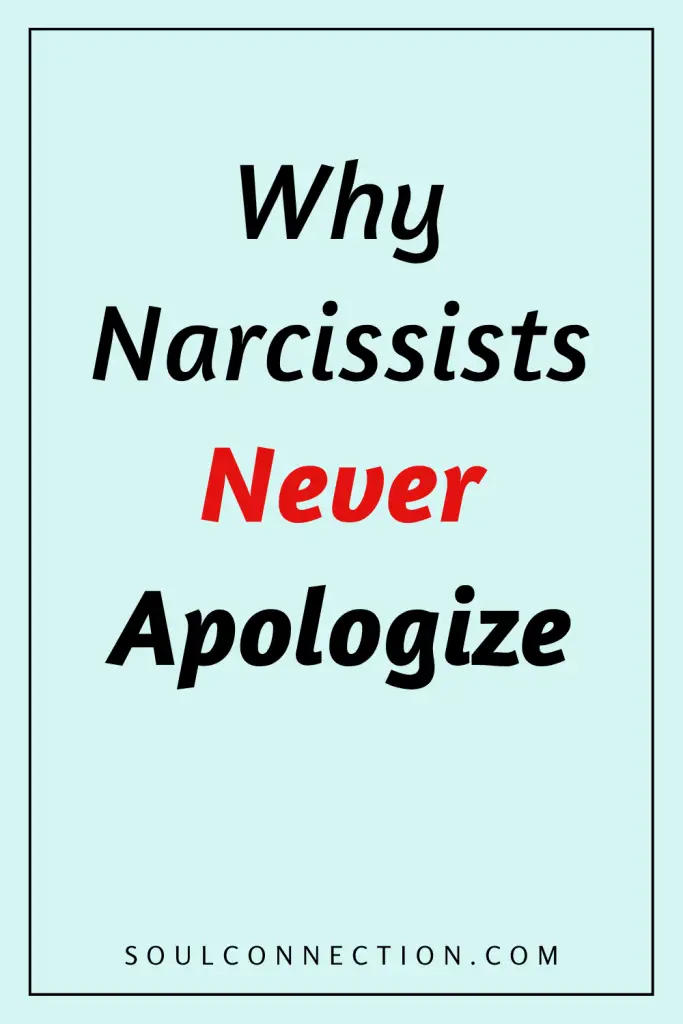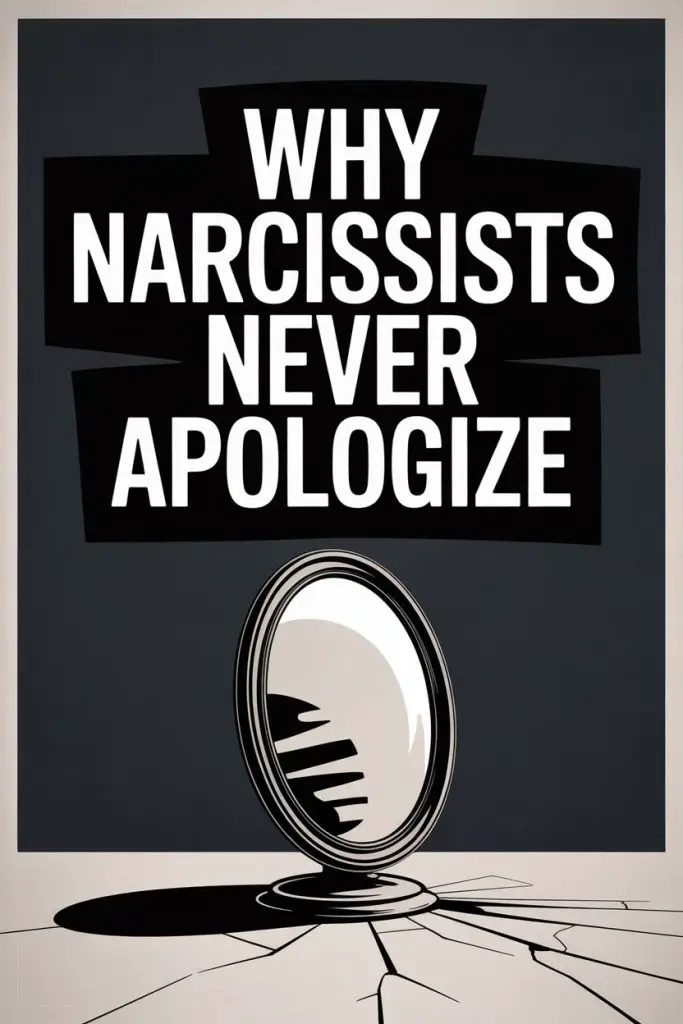Apologies can save relationships, smooth over rough patches, and even turn an awkward dinner into a good story. But when someone with narcissistic traits is at the table, sorry might be the hardest word you’ll never hear.
If you’ve spent hours rehearsing your side of things and dreaming of a heartfelt “I’m sorry,” only to be met with blank stares (or worse, blame), you’re not alone.
Now, on to why that “apology” seems to have gone missing.
The Narcissistic Self-Image
At the heart of narcissism sits a grand, fragile ego that needs constant protection. Think of it as a glass vase perched on a wobbly shelf; it looks imposing, but one wrong move and it shatters.
Apologizing—genuinely, not the “I’m sorry you feel that way” special—requires admitting fault. For a narcissist, this feels like pulling bricks out of their own fortress.
Owning up to mistakes means exposing cracks in their carefully constructed image. And if there’s one thing a narcissist can’t bear, it’s vulnerability.
Apologies as a Loss of Power
For most people, a sincere apology helps restore equality after a misstep. For a narcissist, it feels like handing over the remote control—and they’re not about to miss their favorite show.
Power and control drive much of a narcissist’s behavior. If an apology looks like relinquishing even a smidge of authority, they’ll sidestep it entirely.
Expecting a narcissist to admit fault is a bit like expecting a cat to apologize for knocking your mug off the table: not happening. (You’ll get a tail flick, if you’re lucky.)
Shifting Blame is Their Olympic Sport
When things go wrong, the narcissist’s reflex is to point fingers—anyone’s fingers but their own. This isn’t always cold calculation; sometimes it’s pure self-preservation.
If they did apologize, it would mean taking responsibility, and that’s a game they didn’t sign up to play.
You might hear things like, “Why are you so sensitive?” or “You always overreact.” Translation: The problem isn’t what I did, it’s your reaction to it.
In their world, blame is hot potato. And you, my friend, are always holding it when the music stops.
Emotional Empathy Isn’t Their Strong Suit
Real apologies require empathy: the ability to feel someone else’s pain, to genuinely want to make things right. Narcissists are often missing this crucial ingredient.
They might understand that you’re upset—they’re not clueless—but the emotional resonance isn’t there.
You might get a logical explanation, a perfunctory “sorry,” or even a joke to brush past the issue. But don’t hold your breath for a heartfelt “I really hurt you, and I’m sorry.” Their emotional bandwidth has a lot of static.
Image Management Trumps Honesty
Looking good is everything. Not just physically (although, check the mirror count in their house), but morally and socially. Admitting fault puts a dent in their shiny public armor.
A narcissist’s need to appear flawless in front of friends, family, or even strangers often outweighs any private regret they may feel. If an apology could tarnish their reputation, you’ll hear crickets before confessions.
And if they do finally say sorry in front of others, watch out: it’s probably a performance, complete with crocodile tears and a follow-up blame twist.
Apologies Are Seen as Weakness
From a narcissist’s point of view, saying “I was wrong” is like waving a white flag. Vulnerability equals weakness, and weakness is to be avoided at all costs.
This isn’t just bravado. Many narcissists grew up believing that any sign of weakness would be used against them. Apologies, to them, risk opening the floodgates to criticism, rejection, or loss of control.
To avoid that, they double down. Even when the evidence is stacked against them like a wobbly Jenga tower, they’ll swear the table was crooked.
Cognitive Dissonance is Their Comfort Zone
Cognitive dissonance—the headache you get when your actions don’t match your beliefs—should prompt self-reflection. For a narcissist, it’s just Tuesday.
They might honestly believe they didn’t do anything wrong, even when caught red-handed. The mind bends reality to protect the ego. So, expecting a genuine apology is like waiting for a unicorn to show up at your next barbecue.
The “Non-Apology” Masterclass
If you’re lucky (or maybe not), you might get what I call the “non-apology.” That’s the “I’m sorry you’re upset,” or “Sorry if you took it that way.” It checks the box without ceding any ground.
Watch for backhanded apologies: “I’m sorry, but I wouldn’t have said that if you hadn’t started it.” It’s an art form, really—one that leaves you more frustrated than before.
The Impact on Relationships
Living or loving someone who never apologizes can make you question your own sanity. You start wondering if you’re too sensitive, too needy, or just plain wrong. Spoiler: you’re not.
Healthy relationships need repair after rupture. Without real apologies, trust erodes, resentment festers, and you might find yourself tiptoeing around the truth just to keep the peace.
Tools to Protect Your Sanity Tonight
So, what’s a savvy soul to do?
- Lower the apology bar: Don’t expect grand gestures or emotionally intelligent admissions. You might get a non-apology at best.
- Validate your own feelings: You know what happened; you know what hurt. Don’t let the absence of an apology erase your reality.
- Set boundaries: If you’re never going to hear “I’m sorry,” you may need to protect yourself in other ways. “I don’t appreciate being spoken to like that,” is a perfectly reasonable statement.
- Go for self-care, not scorekeeping: Waiting for accountability from someone who can’t give it is a recipe for frustration. Find your peace elsewhere—whether it’s a walk, a call with a friend, or a bit of cheeky chocolate.
- Seek support: Gaslighting is real; having someone trustworthy to talk to can help you stay grounded.
When an Apology Finally Comes
Once in a blue moon, you might get a real apology. Don’t be startled—narcissists can surprise you! But often, it comes with strings attached or after a major fallout where they fear losing something or someone valuable.
If a genuine apology does appear, notice if patterns change or if it’s a one-off event to keep you from walking out the door. Actions speak louder than words—especially words reluctantly dragged from someone’s lips.
Is Change Possible?
Here’s the million-dollar question: Can a narcissist ever learn to apologize?
Change is rare, but not impossible. Self-awareness, therapy, and a willingness to be vulnerable are key ingredients. Most importantly, they need to want to change.
You can’t do that work for them. What you can do is decide what you’re willing to accept and what you’re not.
Apologies Aren’t Unicorns, But They’re Close
It’s not you, and it’s not your standards. Apologies aren’t just words; they’re acts of empathy, humility, and maturity—the very things narcissism spends a lifetime dodging.
Your peace doesn’t depend on someone else’s sorry. When a narcissist can’t apologize, it says far more about their limitations than your worth.
Tonight, give yourself the closure you need. You’re not waiting for an apology that will never come. And that, my friend, is freedom.


